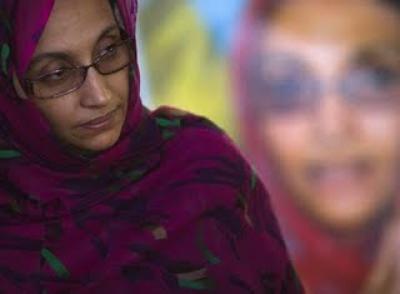Aminatou Haidar, Western Sahara Activist, Returned Home
Nobel Peace Prize nominee Aminatou Haidar has ended the month-long hunger strike initiated in protest to her forced exile from her home in Western Sahara. Ms. Haidar was flown by chartered jet from Lanzarote Airport in the Spanish Canary Islands where she spent nearly a month, refusing to move until her passport was returned to her and Morrocan authorities permitted her to return to her two children and other family members in El Ayoun, Western Sahara.
Known as the Sahrawi Ghandi, Ms. Haidar was accompanied by her Spanish physician, and younger sister, and from the stretcher that carried her aboard the plane she whispered to the press, “his is a victory for international human rights, for international justice, and for the Sahrawi cause.”Unable to walk, she had been sleeping on the airport floor for the past month, her state of health exacerbated by a perforated ulcer and damage caused by a 45 day hunger strike she carried out some years ago.
Western Sahara, a former colony of Spain, was disputed over by Morrocco and Mauritania after the departure of the Spanish. The indigenous people have been engaged in a struggle for autonomy of the region for more than three decades. Ms. Haider, president of the Collective of Sahrawi Human Rights Defenders (CODESA), was previously jailed by Morroccan authorities as a result of her unrelenting but peaceful campaigning for the cause of Western Sahara independence. Haidar declined Spain’s offer of refugee status, accusing Spain of complicity in her deportation. Her passport was confiscated by the Moroccan authorities upon her return from a world tour in support of human rights activities around the globe, having refused to define herself as Morroccan on an official form. Ms. Haidar’ tour also served to garner support for the independence movement of Western Sahara, whose right to self-determination was endorsed by U.N. Resolution 1514 in 1960. She asserts that she should not have been allowed to travel across international boundaries without a passport. Her deportation was condemned by human rights organizations including Amnesty International, Human Rights Watch, as well as her friends and supporters around the world, including a delegation from the Robert Kennedy Foundation in the U.S.who visited her in Lanzarote, and from whom Haidar was awarded the 2008 Human Rights Prize. A rapid deterioration of her condition requiring her hospitalization prompted a storm of diplomatic negotiations between government officials in Madrid, Paris, Rabat,Washington, and the intervention of United Nations Secretary General Ban Ki-moon, Morrocco relented, permitting the return of her passport as she landed in Western Sahara, where two hundred ladies had also refused food in an act of solidarity with Ms. Haidar’s hunger strike.

